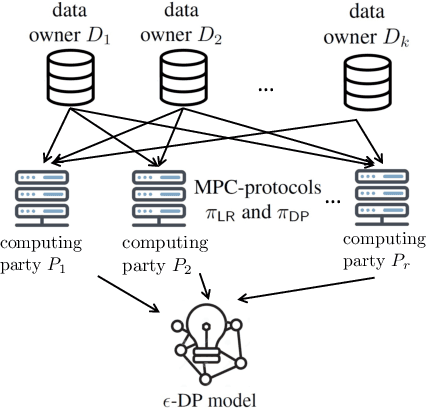Davis Railsback
Training Differentially Private Models with Secure Multiparty Computation
Feb 05, 2022



Abstract:We address the problem of learning a machine learning model from training data that originates at multiple data owners while providing formal privacy guarantees regarding the protection of each owner's data. Existing solutions based on Differential Privacy (DP) achieve this at the cost of a drop in accuracy. Solutions based on Secure Multiparty Computation (MPC) do not incur such accuracy loss but leak information when the trained model is made publicly available. We propose an MPC solution for training DP models. Our solution relies on an MPC protocol for model training, and an MPC protocol for perturbing the trained model coefficients with Laplace noise in a privacy-preserving manner. The resulting MPC+DP approach achieves higher accuracy than a pure DP approach while providing the same formal privacy guarantees. Our work obtained first place in the iDASH2021 Track III competition on confidential computing for secure genome analysis.
Privacy-Preserving Training of Tree Ensembles over Continuous Data
Jun 05, 2021



Abstract:Most existing Secure Multi-Party Computation (MPC) protocols for privacy-preserving training of decision trees over distributed data assume that the features are categorical. In real-life applications, features are often numerical. The standard ``in the clear'' algorithm to grow decision trees on data with continuous values requires sorting of training examples for each feature in the quest for an optimal cut-point in the range of feature values in each node. Sorting is an expensive operation in MPC, hence finding secure protocols that avoid such an expensive step is a relevant problem in privacy-preserving machine learning. In this paper we propose three more efficient alternatives for secure training of decision tree based models on data with continuous features, namely: (1) secure discretization of the data, followed by secure training of a decision tree over the discretized data; (2) secure discretization of the data, followed by secure training of a random forest over the discretized data; and (3) secure training of extremely randomized trees (``extra-trees'') on the original data. Approaches (2) and (3) both involve randomizing feature choices. In addition, in approach (3) cut-points are chosen randomly as well, thereby alleviating the need to sort or to discretize the data up front. We implemented all proposed solutions in the semi-honest setting with additive secret sharing based MPC. In addition to mathematically proving that all proposed approaches are correct and secure, we experimentally evaluated and compared them in terms of classification accuracy and runtime. We privately train tree ensembles over data sets with 1000s of instances or features in a few minutes, with accuracies that are at par with those obtained in the clear. This makes our solution orders of magnitude more efficient than the existing approaches, which are based on oblivious sorting.
Fast Privacy-Preserving Text Classification based on Secure Multiparty Computation
Jan 18, 2021



Abstract:We propose a privacy-preserving Naive Bayes classifier and apply it to the problem of private text classification. In this setting, a party (Alice) holds a text message, while another party (Bob) holds a classifier. At the end of the protocol, Alice will only learn the result of the classifier applied to her text input and Bob learns nothing. Our solution is based on Secure Multiparty Computation (SMC). Our Rust implementation provides a fast and secure solution for the classification of unstructured text. Applying our solution to the case of spam detection (the solution is generic, and can be used in any other scenario in which the Naive Bayes classifier can be employed), we can classify an SMS as spam or ham in less than 340ms in the case where the dictionary size of Bob's model includes all words (n = 5200) and Alice's SMS has at most m = 160 unigrams. In the case with n = 369 and m = 8 (the average of a spam SMS in the database), our solution takes only 21ms.
High Performance Logistic Regression for Privacy-Preserving Genome Analysis
Mar 03, 2020



Abstract:In this paper, we present a secure logistic regression training protocol and its implementation, with a new subprotocol to securely compute the activation function. To the best of our knowledge, we present the fastest existing secure Multi-Party Computation implementation for training logistic regression models on high dimensional genome data distributed across a local area network.
 Add to Chrome
Add to Chrome Add to Firefox
Add to Firefox Add to Edge
Add to Edge